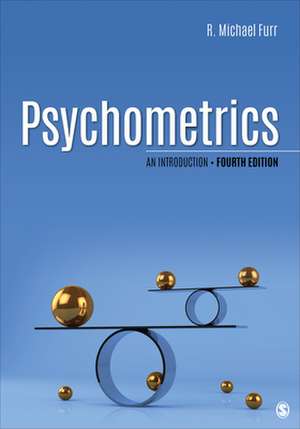Psychometrics: An Introduction
Autor Richard Michael Furren Limba Engleză Paperback – 14 oct 2021
Preț: 971.26 lei
Preț vechi: 1312.52 lei
-26% Nou
185.87€ • 193.81$ • 154.48£
Carte disponibilă
Livrare economică 28 februarie-14 martie
Livrare express 13-19 februarie pentru 52.94 lei
Specificații
ISBN-10: 1071824074
Pagini: 704
Dimensiuni: 178 x 254 x 36 mm
Greutate: 1.2 kg
Ediția:Fourth Edition
Editura: SAGE Publications
Colecția Sage Publications, Inc
Locul publicării:Thousand Oaks, United States
Cuprins
The Conceptual Orientation of This Book, Its Purpose, and the Intended Audience
Organizational Overview
New to This Edition
Author’s Acknowledgments
Publisher’s Acknowledgments
About the Author
Chapter 1. Psychometrics and the Importance of Psychological Measurement
Why Psychological Testing Matters to You
Observable Behavior and Unobservable Psychological Attributes
Psychological Tests: Definition and Types
What Is Psychometrics?
Challenges to Measurement in Psychology
The Importance of Individual Differences
But Psychometrics Goes Well Beyond “Differential” Psychology
Suggested Readings
PART I. BASIC CONCEPTS IN MEASUREMENT
Chapter 2. Scaling
Fundamental Issues With Numbers
Units of Measurement
Additivity and Counting
Four Scales of Measurement
Scales of Measurement: Practical Implications
Additional Issues Regarding Scales of Measurement
Technical Appendix: R Syntax
Summary
Suggested Readings
Chapter 3. Differences, Consistency, and the Meaning of Test Scores
The Nature of Variability
Importance of Individual Differences
Variability and Distributions of Scores
Quantifying the Association or Consistency Between Distributions
Variance and Covariance for “Composite Variables”
Binary Items
Interpreting Test Scores
Test Norms
Technical Appendix: R Syntax
Summary
Suggested Readings
Chapter 4. Test Dimensionality and Factor Analysis
Test Dimensionality
Factor Analysis: Examining the Dimensionality of a Test
Technical Appendix: R Syntax
Summary
Suggested Readings
PART II. RELIABILITY
Chapter 5. Reliability: Conceptual Basis
Overview of Reliability and Classical Test Theory
Observed Scores, True Scores, and Measurement Error
Variances in Observed Scores, True Scores, and Error Scores
Four Ways to Think of Reliability
Reliability and the Standard Error of Measurement
From Theory to Practice: Measurement Models and Their Implications for Estimating Reliability
Domain Sampling Theory
Summary
Suggested Readings
Chapter 6. Empirical Estimates of Reliability
Alternate Forms Method of Estimating Reliability
Test–Retest Method of Estimating Reliability
Internal Consistency Method of Estimating Reliability
Sample Heterogeneity and Reliability Generalization
Reliability of Difference Scores
Technical Appendix: R Syntax
Summary
Suggested Readings
Note
Chapter 7. The Importance of Reliability
Applied Behavioral Practice: Evaluation of an Individual’s Test Score
Behavioral Research
Test Construction and Refinement
Technical Appendix: R Syntax
Summary
Suggested Readings
PART III. VALIDITY
Chapter 8. Validity: Conceptual Basis
What Is Validity?
The Importance of Validity
Validity Evidence: Test Content
Validity Evidence: Internal Structure of the Test
Validity Evidence: Response Processes
Validity Evidence: Associations With Other Variables
Validity Evidence: Consequences of Testing
Other Perspectives on Validity
Contrasting Reliability and Validity
Summary
Suggested Readings
Chapter 9. Estimating and Evaluating Convergent and Discriminant Validity Evidence
A Construct’s Nomological Network
Methods for Evaluating Convergent and Discriminant Validity
Factors Affecting a Validity Coefficient
Interpreting a Validity Coefficient
Technical Appendix: R Syntax
Summary
Suggested Readings
Notes
PART IV. THREATS TO PSYCHOMETRIC QUALITY
Chapter 10. Response Biases
Types of Response Biases
Methods for Coping With Response Biases
Response Biases, Response Sets, and Response Styles
Summary
Suggested Readings
Chapter 11. Test Bias
Why Worry About Test Score Bias?
Detecting Construct Bias: Internal Evaluation of a Test
Detecting Predictive Bias: External Evaluation of a Test
Other Statistical Procedures
Test Fairness
Example: Is the SAT Biased in Terms of Race or Socioeconomic Status?
Technical Appendix: R Syntax
Summary
Suggested Readings
Notes
PART V. ADVANCED PSYCHOMETRIC APPROACHES
Chapter 12. Confirmatory Factor Analysis
On the Use of EFA and CFA
The Process of CFA for Analysis of a Scale’s Internal Structure
CFA and Reliability
CFA and Validity
CFA and Measurement Invariance
Technical Appendix: R Syntax
Summary
Suggested Readings
Chapter 13. Generalizability Theory
Multiple Facets of Measurement
Generalizability, Universes, and Variance Components
G Studies and D Studies
Conducting and Interpreting Generalizability Theory Analysis: A One-Facet Design
Conducting and Interpreting Generalizability Theory Analysis: A Two-Facet Design
Other Measurement Designs
A Practical, Consistency-Oriented Interpretation of Variance Components
Technical Appendix: R Syntax
Summary
Suggested Readings
Notes
Chapter 14. Item Response Theory and Rasch Models
Factors Affecting Responses to Test Items
IRT Measurement Models
Obtaining Parameter Estimates: A 1PL Example
Model Fit
Item and Test Information
Applications of IRT
Technical Appendix: R Syntax
Summary
Suggested Readings
Glossary
References
Index
Notă biografică
Michael Furr is Professor of Psychology and Wright Faculty Fellow at Wake Forest University, where he teaches and conducts research in personality psychology, psychological measurement, and quantitative methods. He earned a BA from the College of William and Mary, an MS from Villanova University, and a PhD from the University of California at Riverside. He is an editor of the ¿Statistical Developments and Applications¿ section of the Journal of Personality Assessment, a former associate editor of the Journal of Research in Personality, a former executive editor of the Journal of Social Psychology, and a consulting editor for several other scholarly journals. He received Wake Forest University¿s 2012 Award for Excellence in Research, and he won the Society for Personality Assessment¿s 2017 Bruno Klopfer Award for Distinguished Contributions to the Literature in Personality Assessment,. He is a fellow of Divisions 5 (Quantitative and Qualitative Methods) and 8 (Social and Personality Psychology) of the American Psychological Association, a fellow of the Association for Psychological Science, and a fellow of the Society for Personality and Social Psychology.
